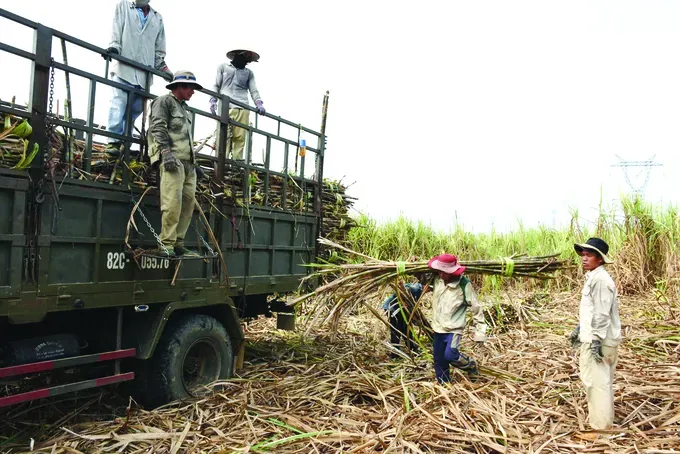
Declining profits
According to the financial reports for the first quarter of 2025 from listed sugar companies, many are facing quite challenging circumstances. Quang Ngai Sugar Joint Stock Company (QNS) announced a net profit of VND392 billion (US$15 million) in the first quarter of 2025, which represents a 26 percent decrease compared to the same period in 2024. This marks QNS's lowest profit since the second quarter of 2023. The sugar segment has been the most adversely impacted, with revenue declining by 35 percent and gross profit falling by 45 percent.
The outlook for profit is not very optimistic, especially as QNS is currently undertaking three major projects, with a total investment exceeding VND5,000 billion. These projects include increasing the capacity of An Khe Sugar Factory to 25,000 tons of sugarcane per day, expanding An Khe Biomass Power Plant to 135MW, and constructing An Khe Ethanol Factory.
For Lam Son Sugar Joint Stock Company, the business results have not shown significant improvement. In the financial year report covering the period from July 1, 2024, to June 30, 2025, the company's net revenue from sales and service provision amounted to VND576.1 billion, reflecting a decrease of 15.54 percent compared to the same period last year. The gross profit from sales and service provision also fell from VND72.6 billion to VND52.9 billion. The profit after corporate income tax was just over VND16.7 billion, whereas it was VND30.05 billion during the same period last year.
In contrast, Son La Sugarcane Joint Stock Company (SLS) reported a 13 percent decline in net profit for the third quarter of the fiscal year, totaling VND89 billion, despite a 20 percent increase in revenue to VND290 billion. This was primarily due to a 40 percent rise in the cost of goods sold, which led to a reduction in the gross profit margin to 30.8 percent, the lowest in two years. Unlike the general trend observed among listed companies, Thanh Thanh Cong - Bien Hoa Joint Stock Company (TTC) stands out as one of the few enterprises that experienced revenue growth in the third quarter of the fiscal year 2024-2025 (from January 1, 2025, to March 31, 2025).
Specifically, their net revenue reached VND7,289 billion, marking an 18 percent increase over the same period last year. However, the cost of goods sold rose at a faster rate than revenue, resulting in a decrease in the gross profit margin to 10.2 percent. In the first nine months of the 2024-2025 fiscal year, SBT (the stock code for TTC on the HOSE) reported revenue of VND21,648 billion (an 11 percent increase) and a net profit of VND652 billion (an 18 percent increase).
Smuggled sugar dominates the local market
The results reported by the aforementioned companies distinctly indicate the current state of the sugar industry. As per the Vietnam Sugarcane and Sugar Association (VSSA) report, there was a significant decline in domestic market demand in May 2025. At the same time, the sugar supply remains exceptionally high, comprising both the output from the new 2024-2025 crop and the inventory from the previous harvest.
In detail, from the start of the 2024-2025 crop year until the end of May 2025, the entire industry has processed 12,680,100 tons of sugarcane, resulting in the production of 1,250,970 tons of various types of sugar. The sugar stock at VSSA factories has reached an unprecedented level, representing over 70 percent of the total output for the 2024-2025 crop year.
Explaining this matter, Chairman Nguyen Van Loc of VSSA recognized that the market is significantly oversaturated and that sugar prices have plummeted. Some factories are even compelled to sell sugar at prices lower than production costs in order to generate funds to compensate farmers for their raw sugarcane, yet even this strategy proves challenging.
The underlying cause is identified as the influx of smuggled sugar into the market. This type of sugar is available at a very low price, while the costs of domestic production remain higher. The disparity in pricing has severely impacted the competitiveness and sales of domestic sugar.
General Director of QNS Vo Thanh Dang expressed his view that the smuggled sugar market shows no signs of abating, with sugar of uncertain origin proliferating in the market, thereby exerting significant pressure on the domestic sugar sector. This situation necessitates that relevant authorities implement more comprehensive solutions to safeguard the domestic sugar industry.
Cao Anh Duong, Director of the Vietnam Sugarcane Research Institute, emphasizes that sustainable development of the Vietnamese sugarcane industry requires strategic measures to strengthen and advance the sugarcane production chain, particularly amid rising crop competition in local areas. To achieve this, sugar companies and factories should implement plans to ensure stable incomes for sugarcane growers by offering purchase prices that cover production costs and generate profits.
In addition, adopting technical and technological innovations is essential to lower costs and boost productivity. A critical measure is establishing a robust legal framework to strictly regulate and monitor imported sugar through official channels, while combating smuggled sugar and trade fraud to safeguard the domestic market.
























